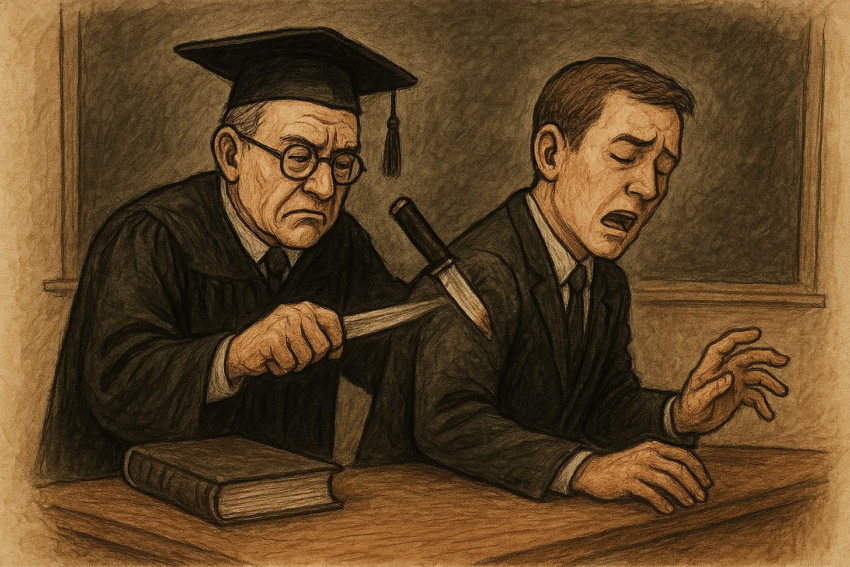Our close colleague, Dr Scott McLachlan, has been sacked from his position as Lecturer in the Faculty of Nursing, Midwifery and Palliative Care, Kings College London. His supposed “crime” was not poor performance, but refusing to stay silent.
Readers will know that Scott was one of the first researchers to expose the scale of Covid-19 vaccine side effects to the world, based on his analysis of VAERS data, and made a hugely significant contribution to our joint covid research work, co-authoring some 25 articles. He was also perhaps the first to expose the ongoing scandal of Lucy Letby’s trial and conviction, revealing evidence and analysis hitherto kept hidden. His series of articles on this is the most comprehensive catalogue of the case anywhere.
In this hearfelt article on his substack, Scott has diarised the events in his career leading up to his sacking, which collectively provide a damning indictment of the state of free speech and academic freedom in the UK today. His case is not unique. It is part of a systemic problem: universities that once championed free inquiry now enforce conformity through intimidation, censorship, and blacklisting. This is not just about Scott. It is about the future of education. If someone with his record can be silenced, so can anyone.
Here are the key events that Scott describes in his article:
-
In nursing school, he faced discrimination for being male. Despite having more than the required work hours to skip a placement, his applications were blocked with shifting excuses. Exams he had passed were marked as failed. Other male students faced similar treatment until almost all had left.
-
At another university, a psychiatric supervisor failed him arbitrarily and even intruded into his private life. He left nursing, pursued IT, and built a successful career. Years later, he returned to study health informatics, excelling academically but exploited for tuition fees and denied degrees he had earned.
-
At Queen Mary University of London he was employed as a Research Fellow on our PamBayesian project but also registered as a part-time PhD student. He completed his PhD in record time, but was kept on insecure contracts to avoid making him permanent staff. When he challenged poor scholarship on Twitter, he faced orchestrated, but frivolous, complaints of racism and sexism. A biased investigation upheld the charges, later overturned, but the damage to his reputation was permanent.
-
He did, however, secure a prestigious Royal Academy of Engineering Fellowship. But, when he tried to move it to Edinburgh, Queen Mary staff leaked the discredited report to HR, sabotaging the move. The same leak resurfaced at Liverpool John Moores University, costing him another post after he had worked successfully there for 6 months.
-
Scott did manage to find a job as a lecturer at Kings College London but was sacked after three years of probation, despite outstanding student reviews, successful publications, and the creation of a popular new course.
-
Censorship accompanied this bureaucratic sabotage. Kings reported his analysis of the Lucy Letby trial to regulators. A DEI officer demanded oversight of his research on medical consent in minors, insisting that work on gender or race must be pre-approved. This was not peer review—it was political policing.
-
Scott’s story highlights a broader collapse of academic freedom. Across the West, universities have become ideological machines: financially exploiting students, suppressing debate, and punishing dissent. Whistleblowers are smeared as racists, misogynists, or spreaders of “disinformation.” The new currency of academia is conformity, not truth.
-
Scott argues that, If universities are to survive as places of knowledge, they must restore free speech, end precarious employment, and stop weaponizing anonymous complaints. DEI offices cannot be censors. Without reform, more academics will be driven out, more truths buried, and society will lose one of its last spaces for genuine inquiry.
It’s an understatement to say that Scott is fearless. Sadly, he has paid a heavy price for his selflessness.
Having worked with Scott for many years we can vouch for the fact that he is a tremendous resource who can turn his hand at many things. In addition to his academic skills, there probably isn’t an aspect of corporate IT he hasn’t touched: systems, networks, software, data. He has managed IT teams from 4 to 20+ people, designed and managed many major projects, and is just as comfortable in the board room with the directors as the network cabinet of the datacentre. Given that he is now unemployed – and almost certainly unemployable in another University, if any of our readers know of any available IT positions for which he might be suitable then please contact him directly.
If you just want to help him out as he navigates his new-found unemployment, please got to his Buy Me A Coffee Page:
Click this link for the original source of this article.
Author: Norman Fenton
This content is courtesy of, and owned and copyrighted by, https://wherearethenumbers.substack.com and its author. This content is made available by use of the public RSS feed offered by the host site and is used for educational purposes only. If you are the author or represent the host site and would like this content removed now and in the future, please contact USSANews.com using the email address in the Contact page found in the website menu.






